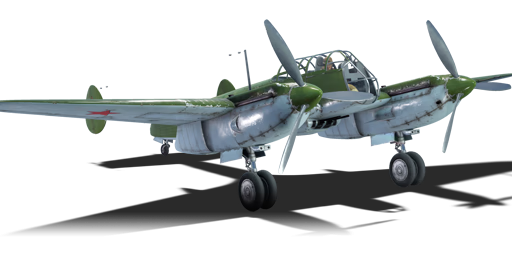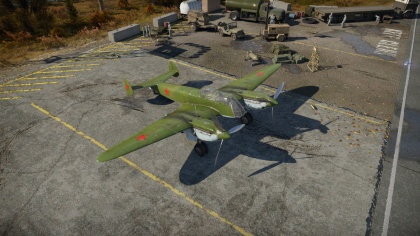Yak-2 KABB
Contents
Description
The Yak-2 KABB is a Rank I Russian attacker
with a battle rating of 2.3 (AB/RB) and 2.7 (SB). This aircraft was introduced in Update 1.75 "La Résistance".
General info
Flight Performance
| Characteristics | |||||||
|---|---|---|---|---|---|---|---|
| Stock | |||||||
| Max Speed (km/h at 4,800 m) |
Max altitude (meters) |
Turn time (seconds) |
Rate of climb (meters/second) |
Take-off run (meters) | |||
| AB | RB | AB | RB | AB | RB | ||
| 492 | 480 | 9100 | 20.3 | 20.6 | 9.2 | 9.2 | 450 |
| Upgraded | |||||||
| Max Speed (km/h at 4,800 m) |
Max altitude (meters) | Turn time (seconds) | Rate of climb (meters/second) |
Take-off run (meters) | |||
| AB | RB | AB | RB | AB | RB | ||
| 548 | 520 | 9100 | 17.9 | 19.8 | 21.0 | 12.8 | 450 |
Details
| Features | ||||
|---|---|---|---|---|
| Combat flap | Take-off flap | Landing flap | Air brakes | Arrestor gear |
| ✓ | ✓ | ✓ | X | X |
| Limits | ||||
|---|---|---|---|---|
| Wing-break speed (km/h) |
Gear limit (km/h) |
Combat flap (km/h) |
Max Static G | |
| + | - | |||
| 0 | 320 | ??? | ~?? | ~? |
| Optimal velocities | |||
|---|---|---|---|
| Ailerons (km/h) |
Rudder (km/h) |
Elevators (km/h) |
Radiator (km/h) |
| < ??? | < ??? | < ??? | > ??? |
| Compressor (RB/SB) | ||
|---|---|---|
| Setting 1 | ||
| Optimal altitude | 100% Engine power | WEP Engine power |
| ?,??? m | ??? hp | ?,??? hp |
Survivability and armour
- 8 mm Steel plate in pilot's seat.
- No armour glazing
- Critical components located at the front of aircraft (fuel, pilot, engine, controls)
- More fuel tanks located in wings near the fuselage
Armaments
Offensive armament
The Yak-2 KABB is armed with:
- 2 x 20 mm ShVAK autocannons, ventral-mounted (150 RPG = 300 total)
- 2 x 7.62 mm ShKAS machine guns, ventral-mounted (500 RPG = 1,000 total)
Suspended armament
The Yak-2 KABB can be outfitted with the following ordinance:
- Without load
- 4 x 100 kg FAB-100 (forged) bombs (400 kg = total)
Usage in the battles
Manual Engine Control
| MEC elements | ||||||
|---|---|---|---|---|---|---|
| Mixer | Pitch | Radiator | Supercharger | Turbocharger | ||
| Oil | Water | Type | ||||
| Controllable | Not controllable | Not controllable | Not controllable | Separate | Not ontrollable | Not controllable |
Modules
| Tier | Flight performance | Survivability | Weaponry | ||
|---|---|---|---|---|---|
| I | Fuselage Repair | Radiator | Offensive 7 mm | ||
| II | Compressor | Airframe | New 7 mm MGs | DZ-40 | |
| III | Wings Repair | Engine | Offensive 20 mm | ||
| IV | Engine Injection | Cover | 20 mm Cannons | ||
Pros and cons
Pros:
- Multi-role - Fighter/Ground Attacker
- Very manoeuvrable at low altitudes
- Powerful armament it consists of 2 ShVAKs Cannons and 2 ShKAS machine guns
- Armament is more than adequate to destroy enemy aircraft
- Good speed it allows it to be used as a bomber interceptor
- Can actually be used as a heavy fighter
- Decent rate of climb
Cons:
- Payload option is only 4 x 100 kg bomb. Making the base-bombing almost ineffective
- No defensive armaments
- Although the manoeuvrability is redeeming, the speed is another story
- The cockpit doesn't have armoured plexiglass, head-on attacks are very dangerous
- Engines are easily damaged/water cooled
- Controls stiffen in high-speed dives
History
George Mozharovsky and Ivan Venevidov (MV) were two renowned designers of aircraft armament. They specialized in developing and building many variants of reloading systems, targeting sights, weapon suspensions systems, bomb deployment mounts and the "MV" series of aircraft gun turrets. In late 1940, Mozharovsky and Venevidov invented a new type of gun mount for attack aircraft called the "комбинированной артиллерийско-бомбардировочной батареей" (Russian for "Combined artillery-bomb battery") or KABB for short which was mounted to the ventral side of the aircraft. The premise behind this gun mount was it utilized two 20-mm ShVAK cannons and two ShKAS machine guns and the cannons could be pivoted mechanically from horizontal to downside of a maximum of 30 degrees. The cannons pivoted electrically while they were connected to the K-8T gun sight which pivoted mechanically tracking with the cannons, automatically adjusting as the cannons moved. The cannons could be fixed at an intermediate position between the 0 and 30-degree range. This system allowed the pilot to maintain horizontal flight and set up for his bombing run while suppressing the target with cannon fire at the same time. Hence the name for "combined artillery-bomb battery."
Installation of the KABB-MV system into the Yak-2 required significant modifications to the main fuselage and cockpit. The nose of the aircraft was removed along with part of the side panels to allow for the installation of plexiglass, significantly improving the visual field of the pilot. Bomber controls were also relocated into the pilot’s cockpit due to the navigator/bomber/gunner position being removed. Because of the installation of the fixed and movable frames of the KABB system and addition of ammunition cartridge boxes, the floor of the navigator’s cabin was removed.
Tests of this new system in March to April 1941 produced favourable results, with recommendations to attach this new system to single and double-engined aircraft. Unfortunately, the German invasion in June 1941 halted all prototype work to focus on the enemy threat.
Media
An excellent addition to the article will be video guides, as well as screenshots from the game and photos.
Read also
Links to the articles on the War Thunder Wiki that you think will be useful for the reader, for example,
- reference to the series of the aircraft;
- links to approximate analogues of other nations and research trees.
Sources
- Yak-2 with KABB-MV
- Штурмовик Як-2 КАББ (Shturmovyk Yak-2 KABB)
- Mozharovski MV Kombain (Shturmovik) aircraft
| USSR strike aircraft | |
|---|---|
| IL-2 | IL-2 (1941) · IL-2 (1942) · IL-2M (1943) · IL-2M type 3 · IL-2M "Avenger" · IL-2-37 · IL-2 M-82 |
| IL-8 | IL-8 (1944) |
| IL-10 | IL-10 · IL-10 (1946) |
| Pe-3 | Pe-3 (e) · Pe-3 · Pe-3bis |
| Su-2 | BB-1 · Su-2 MV-5 · Su-2 TSS-1 · Su-2 (M-82) |
| Su-6 | Su-6 · Su-6 (AM-42) · Su-6 (M-71F) |
| Su-8 | Su-8 |
| Tandem MAI | Tandem MAI |
| TIS MA | TIS MA |
| Tu-1 | Tu-1 |
| Yak-2 | Yak-2 KABB |





